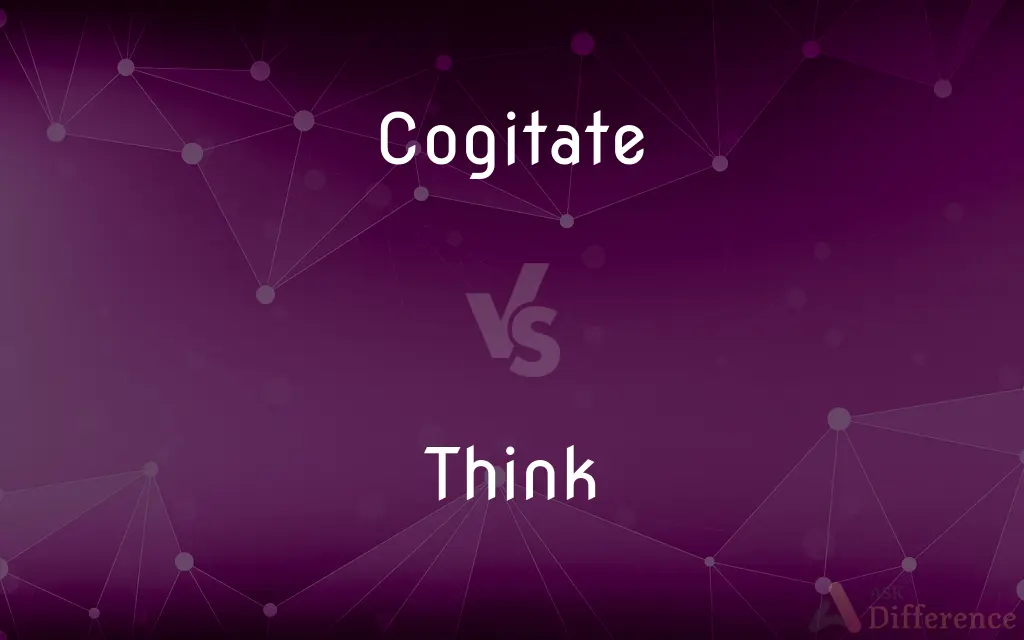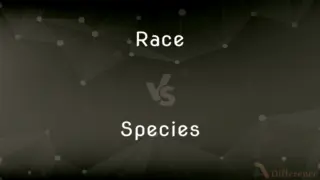Cogitate vs. Think — What's the Difference?
By Tayyaba Rehman — Updated on August 17, 2023
Cogitate means to think deeply or reflect, while think can refer to any mental activity or process of considering something.

Difference Between Cogitate and Think
Table of Contents
ADVERTISEMENT
Key Differences
Cogitate and think both pertain to the process of mental activity. The term "think" is broad and can encompass a wide range of cognitive activities, from simple recognitions to deep reflections. On the other hand, to cogitate is a much more focused term that emphasizes deep contemplation or thorough consideration.
Think is a term that is more commonly used in everyday speech. When we use the word "think," we often mean to express an opinion, belief, or idea, such as "I think it might rain today." It can be used for spontaneous thoughts as well as for more deliberate ones. Cogitate, conversely, isn't used as casually. It implies a more deliberate and in-depth thinking process, almost like mulling over a particular subject or idea.
The origin of the words also offers some insight into their meanings. "Think" comes from Old English "þencan," meaning to conceive in the mind. Its usage has remained broad. "Cogitate," on the other hand, comes from the Latin word "cogitare," which means to ponder or think deeply about. This origin is indicative of its more intensive and profound connotation.
While both cogitate and think relate to mental processes, the former signifies a deeper, more deliberate contemplation, while the latter can refer to a broad spectrum of cognitive activities, both superficial and profound.
Comparison Chart
Definition
To ponder or contemplate deeply.
To form ideas or opinions in the mind.
ADVERTISEMENT
Common Usage
Less commonly used in casual conversation.
Commonly used in everyday speech.
Depth of Thought
Implies a more intensive, thorough thinking process.
Can refer to both casual and deep cognitive activities.
Compare with Definitions
Cogitate
To think deeply and carefully about something.
She took a moment to cogitate on the proposal before responding.
Think
To bring to mind or remember.
I can't think of the name right now.
Cogitate
To meditate or muse over a particular topic.
The poet would cogitate on the beauty of nature.
Think
To have an opinion or hold a particular view.
Do you think it's going to rain today?
Cogitate
To ponder or reflect on a particular subject.
Philosophers often cogitate on the meaning of life.
Think
To have an idea or belief about something.
I think this dress looks nice on you.
Cogitate
To consider with thoroughness and intensity.
He would cogitate on the problem for hours.
Think
To consider or contemplate a particular subject.
Give me a moment to think about your offer.
Cogitate
To engage in serious thought or contemplation.
The scientist cogitated on the new findings.
Think
To use one's mind actively to form ideas.
It's important to think before speaking.
Cogitate
To take careful thought or think carefully about; ponder.
Think
To have or formulate in the mind
Think the happiest thought you can think.
Cogitate
(intransitive) To meditate, to ponder, to think deeply.
Think
To reason about or reflect on; ponder
Think how complex language is. Think the matter through.
Cogitate
(transitive) To consider, to devise.
Think
To decide by reasoning, reflection, or pondering
Thinking what to do.
Cogitate
To engage in continuous thought; to think.
He that calleth a thing into his mind, whether by impression or recordation, cogitateth and considereth, and he that employeth the faculty of his fancy also cogitateth.
Think
To judge or regard; look upon
I think it only fair.
Cogitate
To think over; to plan.
He . . . is our witness, how we both day and night, revolving in our minds, did cogitate nothing more than how to satisfy the parts of a good pastor.
Think
To believe; suppose
Always thought he was right.
Cogitate
Consider carefully and deeply; reflect upon; turn over in one's mind
Think
To expect; hope
They thought she'd arrive early.
Cogitate
Use or exercise the mind or one's power of reason in order to make inferences, decisions, or arrive at a solution or judgments;
I've been thinking all day and getting nowhere
Think
To intend
She thinks to defeat the incumbent in the election.
Think
To call to mind; remember
I can't think what her name was.
Think
To visualize; imagine
Think what a scene it will be at the reunion.
Think
To devise or evolve; invent
Thought up a plan to get rich quick.
Think
To bring into a given condition by mental preoccupation
He thought himself into a panic over the impending examination.
Think
To concentrate one's thoughts on; keep as a point of focus
Think victory.
Think
To exercise the power of reason, as by conceiving ideas, drawing inferences, and using judgment
My cold made it difficult to think.
Think
To consider or weigh an idea
They are thinking about moving.
Think
To bring a thought to mind by using the imagination
No one before had thought of bifocal glasses.
Think
To recall a thought or an image to mind
She thought of her childhood when she saw the movie.
Think
To have a belief, supposition, or opinion
He thinks of himself as a wit. It's later than you think.
Think
To have care or consideration
Think first of the ones you love.
Think
To use the mind in a certain way
He thinks just like you do—always worrying.
Think
Requiring much thought to create or assimilate
A think book.
Think
The act or an instance of deliberate or extended thinking; a meditation.
Think
(transitive) To ponder, to go over in one's head.
Idly, the detective thought what his next move should be.
Think
(intransitive) To communicate to oneself in one's mind, to try to find a solution to a problem.
I thought for three hours about the problem and still couldn’t find the solution.
Think
(intransitive) To conceive of something or someone (usually followed by of; infrequently, by on).
I tend to think of her as rather ugly.
Think
(transitive) To be of opinion (that); to consider, judge, regard, or look upon (something) as.
At the time I thought his adamant refusal to give in right.
I hope you won’t think me stupid if I ask you what that means.
I think she is pretty, contrary to most people.
Boxing is thought to be a dangerous sport.
Think
(transitive) To guess; to reckon.
I think she’ll pass the examination.
Think
To plan; to be considering; to be of a mind (to do something).
Think
To presume; to venture.
Think
To seem, to appear.
Think
An act of thinking; consideration (of something).
I'll have a think about that and let you know.
Think
To seem or appear; - used chiefly in the expressions methinketh or methinks, and methought.
Think
To employ any of the intellectual powers except that of simple perception through the senses; to exercise the higher intellectual faculties.
For that I amI know, because I think.
Think
To call anything to mind; to remember; as, I would have sent the books, but I did not think of it.
Well thought upon; I have it here.
Think
To reflect upon any subject; to muse; to meditate; to ponder; to consider; to deliberate.
And when he thought thereon, he wept.
He thought within himself, saying, What shall I do, because I have no room where to bestow my fruits?
Think
To form an opinion by reasoning; to judge; to conclude; to believe; as, I think it will rain to-morrow.
Let them marry to whom they think best.
Think
To purpose; to intend; to design; to mean.
I thought to promote thee unto great honor.
Thou thought'st to help me.
Think
To presume; to venture.
Think not to say within yourselves, We have Abraham to our father.
Think
To conceive; to imagine.
Charity . . . thinketh no evil.
Think
To plan or design; to plot; to compass.
So little womanhoodAnd natural goodness, as to think the deathOf her own son.
Think
To believe; to consider; to esteem.
Nor think superfluous other's aid.
Think
Act of thinking; a thought.
Think
An instance of deliberate thinking;
I need to give it a good think
Think
Judge or regard; look upon; judge;
I think he is very smart
I believe her to be very smart
I think that he is her boyfriend
The racist conceives such people to be inferior
Think
Expect, believe, or suppose;
I imagine she earned a lot of money with her new novel
I thought to find her in a bad state
He didn't think to find her in the kitchen
I guess she is angry at me for standing her up
Think
Use or exercise the mind or one's power of reason in order to make inferences, decisions, or arrive at a solution or judgments;
I've been thinking all day and getting nowhere
Think
Recall knowledge from memory; have a recollection;
I can't remember saying any such thing
I can't think what her last name was
Can you remember her phone number?
Do you remember that he once loved you?
Call up memories
Think
Imagine or visualize;
Just think--you could be rich one day!
Think what a scene it must have been!
Think
Focus one's attention on a certain state;
Think big
Think thin
Think
Have in mind as a purpose;
I mean no harm
I only meant to help you
She didn't think to harm me
We thought to return early that night
Think
Decide by pondering, reasoning, or reflecting;
Can you think what to do next?
Think
Ponder; reflect on, or reason about;
Think the matter through
Think how hard life in Russia must be these days
Think
Dispose the mind in a certain way;
Do you really think so?
Think
Have or formulate in the mind;
Think good thoughts
Think
Be capable of conscious thought;
Man is the only creature that thinks
Think
Bring into a given condition by mental preoccupation;
She thought herself into a state of panic over the final exam
Common Curiosities
What is the difference between cogitate and disregard?
Cogitate means to think deeply or reflect upon something, whereas disregard means to pay no attention to or ignore something.
How do you use cogitate?
Use "cogitate" to express deep thinking or contemplation about a subject: "She cogitated on the implications of the new law."
What is the meaning of the word I think?
"I think" is an expression used to convey one's opinion, belief, or estimation about something.
What is another word for cogitate?
Ponder.
What part of speech is cogitate?
Verb.
What does cogitate mean in a sentence?
In a sentence, "cogitate" refers to the act of deeply considering or reflecting on a particular topic.
What is the other word for I think?
I believe.
What is a better word for think?
Consider.
What is the other synonym of I think?
In my opinion.
Share Your Discovery

Previous Comparison
Eyelashes vs. Lashes
Next Comparison
Race vs. SpeciesAuthor Spotlight
Written by
Tayyaba RehmanTayyaba Rehman is a distinguished writer, currently serving as a primary contributor to askdifference.com. As a researcher in semantics and etymology, Tayyaba's passion for the complexity of languages and their distinctions has found a perfect home on the platform. Tayyaba delves into the intricacies of language, distinguishing between commonly confused words and phrases, thereby providing clarity for readers worldwide.
















































